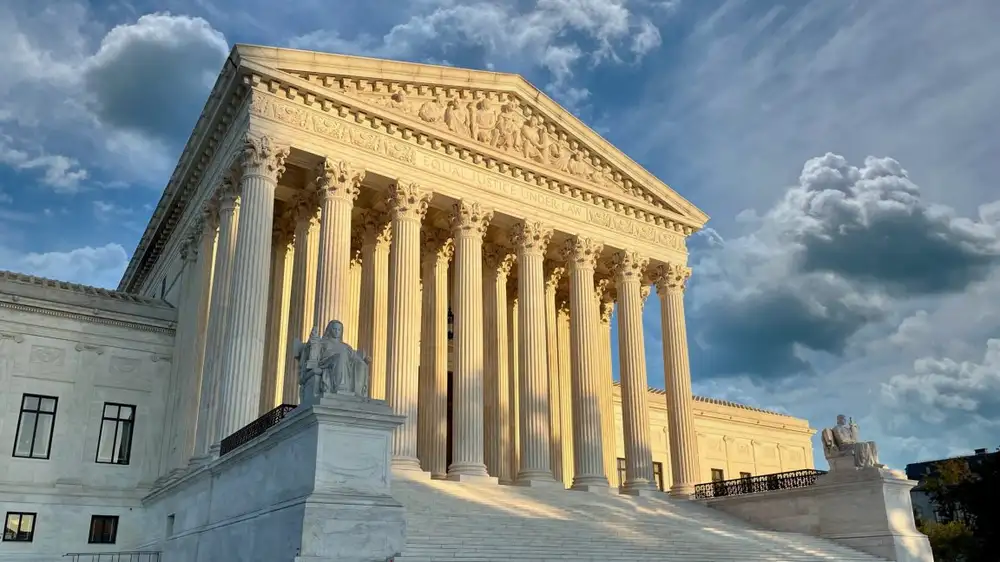The Supreme Court allowed the Department of Government Efficiency (DOGE) to access Social Security Administration (SSA) records on Friday, overturning lower-court decisions that imposed some limits on DOGE's data access.
"We conclude that, under the present circumstances, SSA may proceed to afford members of the SSA DOGE Team access to the agency records in question in order for those members to do their work," the Supreme Court order said. The court also sided with the Trump administration in a different DOGE case, finding that a lower court's discovery order requiring DOGE to provide information about its government cost-cutting operations was too broad (more on that ruling later in this article).
The data-access ruling was in a case filed by the American Federation of State, County and Municipal Employees; the Alliance for Retired Americans; and American Federation of Teachers. US District Judge Ellen Lipton Hollander previously issued a preliminary injunction, writing that DOGE "is essentially engaged in a fishing expedition at SSA, in search of a fraud epidemic, based on little more than suspicion." The District of Maryland judge found that plaintiffs are likely to win their case alleging that the government violated the Privacy Act and the Administrative Procedure Act.
The US Court of Appeals for the 4th Circuit denied the Trump administration's request to stay the preliminary injunction in a 9–6 vote. The Trump administration filed an emergency application to the Supreme Court last month, arguing that the injunction is causing "irreparable harm to the executive branch" and thwarting DOGE's attempts to "eliminate waste and fraud."
The Supreme Court's unsigned ruling didn't go into much detail, which isn't unusual for decisions made on the emergency docket. The majority said that in order to grant a stay, the court evaluates four factors: "(1) whether the stay applicant has made a strong showing that he is likely to succeed on the merits; (2) whether the applicant will be irreparably injured absent a stay; (3) whether issuance of the stay will substantially injure the other parties interested in the proceeding; and (4) where the public interest lies."
The court majority decided "that the application of these factors in this case warrants granting the requested stay." The preliminary injunction is now stayed while litigation continues at the 4th Circuit. The underlying case could make its way back to the Supreme Court.
Dissent: Court bends standards “for certain litigants”
The three justices nominated by Democratic presidents—Ketanji Brown Jackson, Sonia Sotomayor, and Elena Kagan—opposed the stay. A dissent written by Jackson and joined by Sotomayor said:
Today the Court grants "emergency" relief that allows the Social Security Administration (SSA) to hand DOGE staffers the highly sensitive data of millions of Americans. The Government wants to give DOGE unfettered access to this personal, non-anonymized information right now—before the courts have time to assess whether DOGE's access is lawful. So it asks this Court to stay a lower court's decision to place temporary and qualified limits on DOGE's data access while litigation challenging DOGE's authority to access the data is pending. But the Government fails to substantiate its stay request by showing that it or the public will suffer irreparable harm absent this Court's intervention. In essence, the "urgency" underlying the Government's stay application is the mere fact that it cannot be bothered to wait for the litigation process to play out before proceeding as it wishes.
Jackson said the court's emergency-docket practices have become "decoupl[ed] from the traditional harm-reduction justification for equitable stays." In the DOGE case, lower courts are "expeditiously assessing whether federal law permits the SSA to give DOGE staffers unfettered access to Americans' sensitive information," Jackson wrote. The only question before the Supreme Court "is what should happen to all of that data in the meantime," and the government "has not shown that it will suffer any concrete or irreparable harm" if the injunction is enforced while litigation continues, she wrote.
Jackson said the ruling "sends a troubling message" that the court will depart from its usual legal standards "for certain litigants." While other litigants seeking a stay "must point to more than the annoyance of compliance with lower court orders they don't like, the Government can approach the courtroom bar with nothing more than that and obtain relief from this Court nevertheless," Jackson wrote.
Jackson: “Grave privacy risks for millions”
Jackson said the ruling puts at risk personal information like Social Security numbers, birth dates, addresses, bank account numbers, and medical records. "Every person who has received a Social Security number appears in the SSA's data," and the agency administers various programs that collect other personal information, Jackson wrote. The Supreme Court ruling creates "grave privacy risks for millions of Americans," she wrote.
For example, Jackson wrote that Social Security Disability Insurance "collects detailed medical histories (describing, for example, prescriptions, mental-health treatments, and testing results for sensitive health conditions like HIV) from applicants and beneficiaries." The Privacy Act protects this kind of data, prohibiting agencies "from disclosing covered data except in narrow circumstances, such as where agency employees 'have a need for the record in the performance of their duties.'"
The SSA has long had a policy of restricting access, but its data-handling practices "changed dramatically" after President Trump's executive order creating DOGE, Jackson wrote. "Record evidence reflects that DOGE received far broader data access than the SSA customarily affords for fraud, waste, and abuse reviews," Jackson wrote.
Previously, investigations would "start with access to high-level, anonymized data based on the least amount of data the analyst or auditor would need to know," Jackson wrote, referring to evidence given by a former SSA acting chief of staff. Analysts or auditors previously could only obtain "more granular, non-anonymized data" if they found suspicious entries, she wrote.
The lower courts "carefully craft[ed] interim relief tailored to the needs of the moment," Jackson wrote. The injunction was "minimally burdensome" because it "allows the SSA to provide DOGE staffers with access to redacted or anonymized data and SSA records, so long as DOGE staffers meet the training, background-check, and other requirements that generally govern such access," she wrote.
The injunction also allowed access to non-anonymized data "if DOGE gives the agency a written explanation of its specific need for the records," Jackson wrote. The injunction "amounts to a short-term pause on giving DOGE unfettered and uniquely unprotected access to millions of Americans' sensitive, non-anonymized data, paired with reasonable conditions on data access in the interim," but the government was "dissatisfied with even those minor limitations," she wrote.
"With today's decision, it seems as if the Court has truly lost its moorings," Jackson wrote. "It interferes with the lower courts' informed and equitable assessment of how the SSA's data is best accessed during the course of this litigation, and it does so without any showing by the Government that it will actually suffer concrete or irreparable harm from having to comply with the District Court's order."
Another win for Trump
This isn't the only case in which the Trump administration is asking the Supreme Court to block orders related to DOGE. In another case, the administration asked the court to block a ruling that requires DOGE to provide information about its government cost-cutting operations as part of court-ordered discovery.
On Friday, the Supreme Court ruled that the discovery order was too broad. "The portions of the District Court's April 15 discovery order that require the Government to disclose the content of intra–Executive Branch USDS [US DOGE Service] recommendations and whether those recommendations were followed are not appropriately tailored," the court said.
The Supreme Court remanded the case to the US Court of Appeals for the District of Columbia Circuit, ordering it to narrow the discovery order. Jackson, Sotomayor, and Kagan opposed the decision but did not write a formal dissent. The case involves nonprofit watchdog group Citizens for Responsibility and Ethics in Washington (CREW), which sued after DOGE officials refused to provide records requested under the Freedom of Information Act.

 At WWDC, Apple introduces iOS 26 and macOS 26 in major operating system rebrand
At WWDC, Apple introduces iOS 26 and macOS 26 in major operating system rebrand